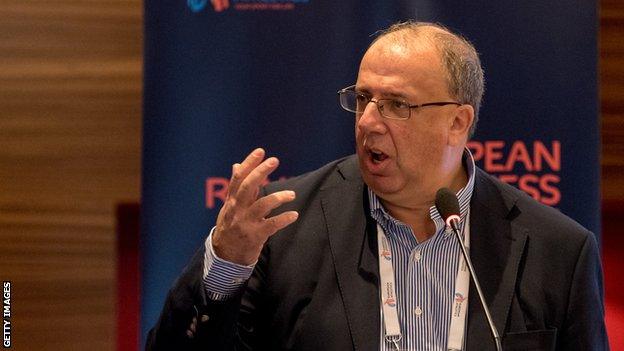British sport accused of 'unacceptable' lack of ethnic diversity in boardrooms
- Published

Sport England chairman Nick Bitel says "practical action and greater, faster change" is required to address the lack of ethnic diversity across boardrooms
The British sport sector has been accused of an "unacceptable" lack of ethnic diversity across its boardrooms.
Research by UK Sport and Sport England revealed that black, Asian and minority ethnic (BAME) people account for just 5.2% of board members in 130 organisations they invest in despite statistics, external showing around 14% of UK population is BAME.
The two funding agencies have now pledged to tackle the issue by developing a pool of experienced board candidates from a variety of backgrounds.
The study also found that women now account for 40% of board members across funded sports, but for those with a disability, that figure was just 5%.
The study also revealed that:
5% BAME board members identified across Sport England and UK Sport-funded bodies, compared to 8% at FTSE 100 firms.
Only 5% (29) of board members declared or consider themselves to have a disability, compared to around 22% in the wider UK population.
The average age of sports board members is 54.
Just under half (43%) of board members we reviewed attended comprehensive schools, compared to 88% of the wider population. One-third (33%) attended grammar schools and around a quarter (24%) were educated privately, compared to just 7% of the wider population who attended fee-paying schools.
Lack of diversity 'completely unacceptable'
"While the greater representation now being seen of women on boards is welcome, the overall picture of diversity in its broadest sense is completely unacceptable and requires practical action and greater, faster change," said Nick Bitel, the chairman of Sport England.
"Organisations with diverse boards have diversity of thought. That means they make better decisions, are more successful, and crucially are better able to understand and reach the audiences we want to engage in sport and physical activity.
"This is one of the most significant and concrete steps forward that Sport England has made in promoting inclusion across the sector and we're committed to continuing this work."
By mid-2021 Sport England and UK Sport want a network of 160 diverse board ready candidates to be in place. A specialist recruitment agency has been appointed to find experienced candidates from a variety of backgrounds including BAME, disabled and LGBT+ to help sport organisations recruit skilled and diverse board members.
"There has been significant progress around the number of women serving on boards across the sport sector, and this is hugely encouraging," said Dame Katherine Grainger, chair of UK Sport.
"But we are under no illusions that there is still a huge amount of work to do in the area of diversity. This is the latest step towards sport boards truly reflecting our diverse and multicultural society."
Lack of boardroom diversity 'doesn't represent the rest of society'
Two years ago sports bodies were told they must improve gender diversity, and have at least 30% female board representation, or risk losing pubic funding.
Grainger told BBC Sport: "It won't happen overnight, but this initiative is designed to start to shift the numbers, and if it doesn't shift then we'll talk about targets."
Grainger admitted she was "surprised" by the low numbers of BAME and disabled board members currently on boards, saying: "It feels like a low number that doesn't represent the rest of society.
"I want to see sport represented in the best possible way across the broadest background. That's not the situation right now and you want to make sure we get to a more representative place.
"Many people look at these boards currently and don't see versions of themselves, and we need to get past that point."
A lack of diversity in governance and leadership positions has long been seen as a major problem in football.
Earlier this month, former Manchester City captain Vincent Kompany linked the issue with a failure to crackdown on racism.
"If you don't have diversity in places of power like boardrooms, then you will not receive the correct penalties, that is the real problem," he told the Standard., external
Last month QPR director of football Les Ferdinand said that football had a "massive unconscious bias" against BAME executives.
He told Training Ground Guru, external he owed his job to the fact that the club had an unusually diverse board.
A report by anti-discriminatory body Fare in 2016 found that across European football, 0.6% of senior governance positions were held by ethnic minorities.